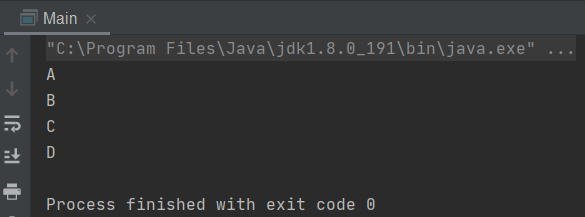Author:Gorit
Date:2020/12/1
Refer:《图解设计模式》
一、Iterator 模式
1.1 Iterator 由来
我们常见的循环遍历的方式
int[] arr = new int[199];for (int i=0;i<arr.length;i++) {...}
这里的循环变量 i 的作用抽象化,通用化后形成的模式,在设计模式中称为 Iterator 模式
用于在数据集合中按照顺序遍历集合,iterator 有反复做某件事的意思,因此称为“迭代器”
1.2 实现 Iterator
我们将编写一个将书 (Book) 放入书架(BookShelf),并将书的名字按顺序显示出来,需要用到如下模块
| 类(接口) | 功能 |
|---|---|
| Aggregate 接口 | 所要遍历的集合的接口,实现该接口的类将成为一个可以多个元素的集合,就像数组一样 |
| Iterator 接口 | 遍历集合的接口 |
| Book 类 | 表示书的类 |
| BookShelf 类 | 表示书架的类 |
| BookShelfIterator | 遍历书架的类 |
| Main | 测试 |
Aggregate 接口
package Iterator;public interface Aggregate {// 该方法会生成一个用于遍历集合的迭代器,当需要遍历集合的元素时,可以调用该方法public abstract Iterator iterator();}
Iterator 接口
package Iterator;/*** 用于遍历集合中的元素,相当于循环中的循环变量* 以下实现了一个最简单的 Iterator 接口*/public interface Iterator {public abstract boolean hasNext(); // 是否有下一个元素public abstract Object next(); // 下一个元素的值}
Book 类
package Iterator;/*** 书籍的最小实体*/public class Book {private String name;public Book(String name) {this.name = name;}public String getName() {return name;}}
BookShelf 类
package Iterator;/*** 表示书架的类,改类需要作为集合保存 所有的书籍,因此需要实现 Aggregate 接口*/public class BookShelf implements Aggregate {private Book[] books;private int last = 0;public BookShelf(int maxsize) {this.books = new Book[maxsize];}public Book getBookAt(int index) {return books[index];}public void appendBook(Book book) {this.books[last] = book;last++;}public int getLength() {return last;}// ps 当外部想要遍历书架时,就会调用这个方法:public Iterator iterator() {return new BookShelfIterator(this);}}
BookShelfIterator 类
package Iterator;
/**
* 用于遍历书架的 BookShelfIterator 类
* 该接口要发挥 Iterator 的作用,因此要实现 Iterator接口
*/
public class BookShelfIterator implements Iterator {
// 要遍历的书架
private BookShelf bookShelf;
private int index;
public BookShelfIterator(BookShelf bookShelf) {
this.bookShelf = bookShelf;
this.index = 0;
}
public boolean hasNext() {
if (index < bookShelf.getLength()) {
return true;
}
return false;
}
public Object next() {
Book book = bookShelf.getBookAt(index++);
return book;
}
}
Main
package Iterator;
public class Main {
public static void main(String[] args) {
BookShelf bookShelf = new BookShelf(4);
bookShelf.appendBook(new Book("A"));
bookShelf.appendBook(new Book("B"));
bookShelf.appendBook(new Book("C"));
bookShelf.appendBook(new Book("D"));
Iterator it = bookShelf.iterator();
while (it.hasNext()) {
Book book = (Book) it.next();
System.out.println(book.getName());
}
}
}


